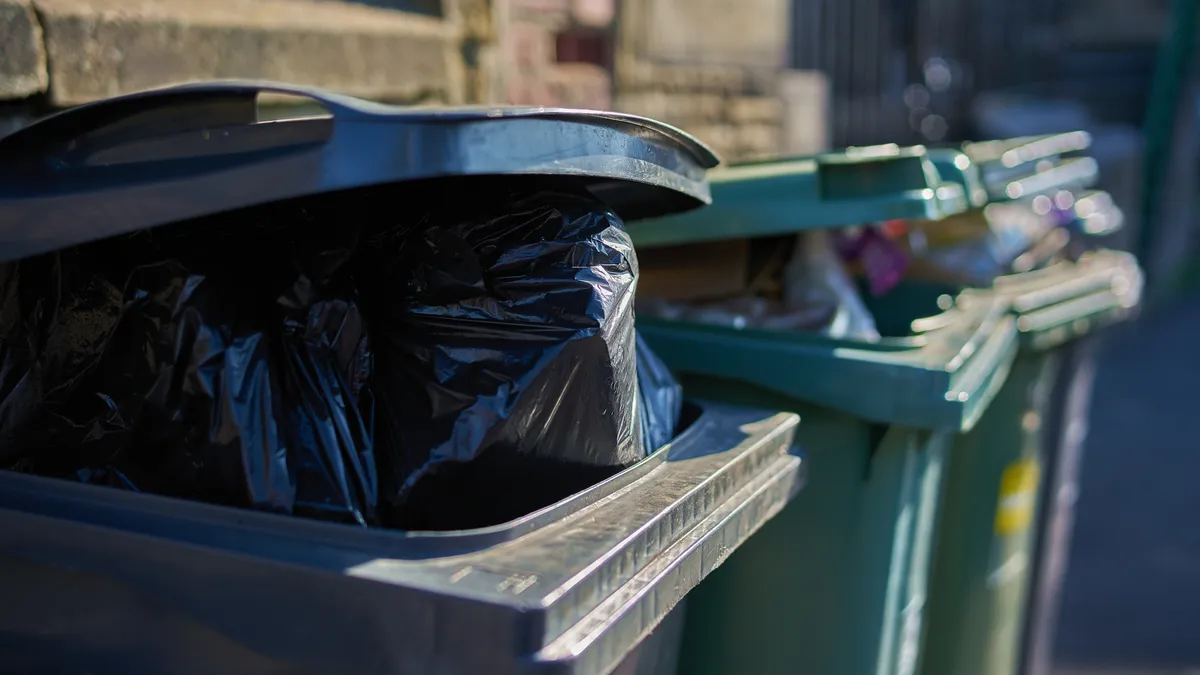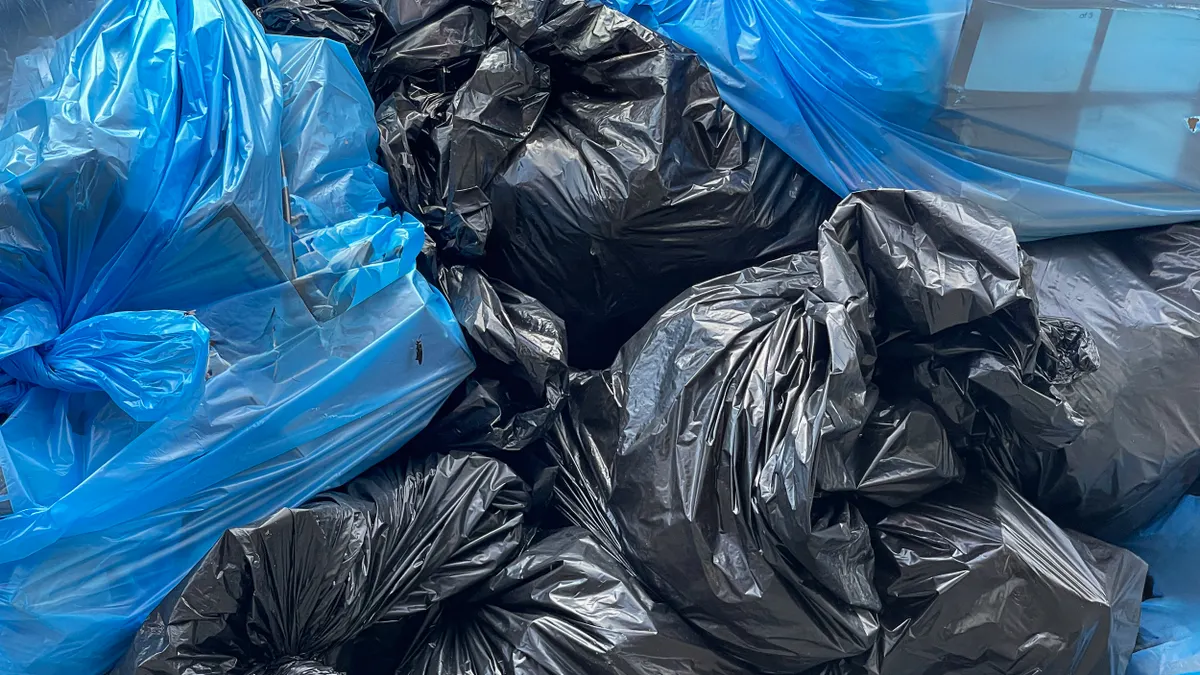Deadlines are nearing for numerous grants offering millions of dollars in funding for waste and recycling-related programs and projects.
The U.S. EPA and U.S. Department of Agriculture are among the agencies managing the programs, which range from recycling infrastructure, education, environmental justice, organics and other climate-related initiatives.
The upcoming grants build on a historic amount of money awarded for recycling projects last year. Much of the funding available for waste and recycling initiatives has come from the Inflation Reduction Act and the Infrastructure Investment and Jobs Act. The EPA recently announced a new round of funding through the Solid Waste Infrastructure for Recycling grant and Recycling Education and Outreach grant programs, but other opportunities are also available.
Know of other relevant funding sources? Let us know at waste.dive.editors@industrydive.com. The grants below are listed in the order they are due.
Tribal Program Support Cooperative Agreements
Available funding: $3.48 million
Application due: Oct. 10, 2024
Who’s eligible: EPA will make funding available for two five-year collaborative agreements meant to offer tribal governments training, technical assistance or other tools. The goal is to help “build capacity on waste management, cleanup, pollution prevention, and emergency response programs in Indian country,” EPA said.
Sustainable Materials Management Grants: EPA Region 4
Available funding: $250,000
Application due: Oct. 31, 2024
Who’s eligible: The program aims to “improve community resilience and sustainability” through sustainable materials management approaches. Applicants’ projects must take place within EPA Region 4, which includes Alabama, Florida, Georgia, Kentucky, Mississippi, North Carolina, South Carolina and Tennessee, as well as six tribes.
According to the EPA, applicants must also select at least one of these technical assistance methods: research, investigation, experiments, education, training, studies and/or demonstration of innovative techniques.
Healthy Communities Grant Program: EPA Region 1
Available funding: $500,000
Application due: Nov. 1, 2024
Who’s eligible: The grant program offers funding for communities in New England “to reduce environmental risks to protect and improve human health and the quality of life.” Environmental justice, pollution prevention and sustainable materials management projects are among the accepted project categories.
Eligible projects must either be located in or show a measurable environmental or public health impact in Region 1, which includes Connecticut, Maine, Massachusetts, New Hampshire, Rhode Island, Vermont and 10 tribal nations. Eligible applicants include state and local governments, public or quasi-public nonprofit organizations, tribal governments, K-12 schools or school districts and nonprofit organizations.
Trash Free Waters Art and Slogan Competition: Gulf states
Available funding: $3 million
Application due: Nov. 5, 2024
Who’s eligible: The winning applicant will create and manage a statewide high school art and slogan competition to reduce plastic and trash in freshwater or marine systems in one of the five Gulf states (Texas, Louisiana, Mississippi, Alabama, Florida). The project should be located in one state and be within the Gulf of Mexico watershed, according to the EPA. The EPA expects to award five winners, one from each of the gulf states.
State and local governments, tribal governments, intertribal consortia, interstate agencies, public and private universities and colleges, public or private nonprofit institutions are eligible to apply.
Trash Free Waters: Micro/Nanoplastics in the Gulf of Mexico
Available funding: $5 million
Application due: Nov. 5, 2024
Who’s eligible: The program calls for innovative projects that prevent microplastics or nanoplastics from reaching waterways, as well as projects that remove microplastics from waterways or make information about them more accessible, according to the EPA. Projects should focus on at least one area: removal, prevention or research. The project should be located in one of the five Gulf states and be within the Gulf of Mexico watershed, according to the EPA.
State and local governments, tribal governments, intertribal consortia, interstate agencies, public and private universities and colleges, and public or private nonprofit institutions are eligible to apply.
USDA Community Food Projects
Available funding: $4.8 million
Application due: Nov. 7, 2024
Who’s eligible: Applicants must meet short and long-term goals meant to help address food and nutrition insecurity. Food loss and waste reduction projects are eligible. Public food program service providers, tribal organizations and private nonprofit entities can apply and are encouraged to collaborate with nonprofits or for-profit entities, including academic institutions, community-based organizations and local government entities, according to the USDA.
Community Change Grants
Available funding: $2 billion
Application due: Rolling basis, with a final Nov. 21, 2024 deadline
Who’s eligible: The Community Change Grants program, focused on environmental justice projects, aims to fund projects that reduce pollution and help create climate resilience, specifically in communities “most adversely and disproportionately impacted by climate change, legacy pollution, and historical disinvestments.” Some waste and recycling projects may be eligible for funding. The grants are open to community-based non-profit organizations (CBOs) that partner either with another CBO or with a federally-recognized tribe, a local government or a higher education institution.
The funding comes from the Inflation Reduction Act. A previous round of funding helped fund local trails, electric vehicle repairs and parks projects.
Solid Waste Infrastructure for Recycling Grants
Available funding: $78 million ($58 million for local governments below the state level and $20 million for tribes and intertribal consortia.)
Application due: Dec. 20, 2024 for local governments; March 14, 2025 for tribes and intertribal consortia.
Who’s eligible: The new round of SWIFR grants, available to both local governments and tribes, are meant to support projects that will “improve collection, transport, systems, and processes related to post-use materials.” Previous projects funded through SWIFR include compost, MRF and curbside collection programs across the country.
Recycling Education and Outreach Grant Program
Available funding: $39 million
Application due: Dec. 20, 2024
Who’s eligible: EPA will fund a coalition that will create three projects: a national campaign to reduce consumer food waste, a project to boost compost sales and a project to educate households on compost. Eligible entities for the coalition include states, local governments, tribes, representatives from Native Hawaiian organizations and U.S. territories, nonprofit organizations and public-private partnerships. Previous REO grants went to projects such as a community recycling ambassador program, neighborhood outreach campaigns and other training and technical support.



















